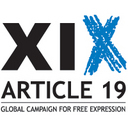
(A PDF version of this statement is available here. The Spanish version is available here.)
The controversy over the latest release of documents by Wikileaks and major
newspapers should not be used by nations as an excuse to limit citizens' rights to access information. ARTICLE 19 calls on governments around the world to fulfil their obligations to transparency and the public's right to know, including the obligation to give full effect to principles of proactive and mandatory disclosure of information.
"Information is the oxygen of democracy," says Dr Agnes Callamard, ARTICLE 19 Executive Director. "Rather than passing more secrecy laws and threatening to prosecute journalists and whistleblowers, governments should focus on making more information available and only protecting that which can cause substantive harm. At the same time, journalists have an obligation to exercise caution when revealing possibly sensitive information."
As ARTICLE 19 highlighted previously, respect for international standards on freedom of information and protection of whistleblowers are paramount to the debates on issues raised by latest releases. ARTICLE 19 maintains that under these standards, any restrictions on access to information must fall within the scope of the limited regime of exceptions. It is public bodies who are obliged to show that disclosure of the information would cause substantial harm and information should still be disclosed if the benefits of disclosure outweigh such harm. States should also adopt and implement a legal and policy framework that protects whistleblowers from
prosecution, and allow for public interest exemptions for revealing information such as corruption or human rights abuses.
ARTICLE 19 notes that much of the information contained in the cables appears to be already available in the public domain. None of the released documents were classified as top secret and most of the information in those six per cent classified as secret was also publically known. Further, these documents would likely be released anyway in the course of requests under the US Freedom of Information Act.
ARTICLE 19 is concerned about efforts by the US Government and other countries to prosecute a Wikileaks representative for violating the Espionage Act or other national Officials Secrets Acts. It is an obligation of governments - not of media and private individuals - to protect the confidentiality of official information if necessary under legitimate interests. We also urge the media, government officials, academics, and others to condemn calls for violence against Wikileaks staff and whistleblowers.
ARTICLE 19 also rejects calls and demands to maintain or expand secrecy legislation rather than adopt a comprehensive right to information framework, including the obligation of proactive disclosure. Nations without freedom of information laws such as Singapore have used the Wikileaks revelations as an excuse to justify their current restrictive regimes, while China has blocked internet access to the site. We call on all governments to respect of the right to information and its importance in democratic processes.
ARTICLE 19 does not believe that the leaks are likely to chill the speech of officials and rejects any policy changes that would impact on the free flow of information in this area. Studies of the effects of right to information legislation in numerous countries have found that there has been little impact on the amount of information that is recorded or that opinions are blunted following an increase in transparency. In fact, in some cases, they have found that the quality of documents has improved with the knowledge that it will become public some day, and focus on provision of real political analysis. Officials have a duty to pass on important information and that is not lifted because of fears that it one day may become public. The US FOIA has been in effect for over 40 years so several generations of officials have learned to live with it.
ARTICLE 19 welcomes the apparently extensive efforts by the newspapers involved in the release of the embassy cables to review the documents, place them in context and ensure that the release of the information did not cause serious harm. Most of the analysis has been serious and has shone an important light on relations between nations. We also commend the fact that it was the combination and collaboration of electronic and mainstream media that gave strength to the latest release.
FURTHER INFORMATION:
For more information please contact: David Banisar, Senior Legal Counsel,
ARTICLE 19, banisar@article19.org +44 20 7324 2500;
ARTICLE 19's previous statement on WikiLeaks is available at:
http://www.article19.org/pdfs/press/wikileaks-and-internet-disclosures.pdf;
ARTICLE 19 is an independent human rights organisation that works globally to protect and promote the right to freedom of expression. It takes its name from Article 19 of the Universal Declaration of Human Rights, which guarantees free speech. For more information on ARTICLE 19 please visit www.article19.org.
Theme by Danetsoft and Danang Probo Sayekti inspired by Maksimer